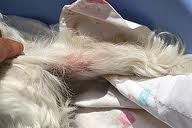Hypothyroidism In Dogs: What You Need To Know About Holistic Options
Hypothyroid disease only occurs in dogs. The thyroid gland regulates your pet’s metabolism. In this article you will learn about the common signs of thyroid disease, plus how your veterinarian can properly diagnose it. Then you’ll learn about the most important treatment for hypothyroidism, with a special emphasis on the safe and effective holistic options.
This is the most common hormone imbalance of dogs. The condition is due to inadequate production of thyroid hormone (T4), produced from your dog’s thyroid gland. In most dogs the cause is auto-immune, meaning your dog’s immune system attacks the thyroid gland, causing inadequate production of thyroid hormone.
Signs relating to low thyroid hormone in dogs are varied, but can include: weight gain without an increase in appetite, lethargy and lack of desire to exercise, cold intolerance (gets cold easily), elevated blood cholesterol, anemia, and a number of skin changes. The skin problems can include: dry, dull coat with excessive shedding and flaking, very thin to nearly bald coat, increased dark pigmentation in the skin, increased susceptibility and occurrence of skin and ear infections and failure to re-grow hair after clipping or shaving.
Breeds most likely to be hypothyroid include: Golden Retriever, Doberman Pinscher, Irish Setter, Dachshund, Boxer and Great Dane. Virtually all hypothyroid dogs have some type of skin problem ( ie hair loss, skin infection), and over 50% of hypothyroid dogs are obese and act lethargic. There are less common symptoms and associated disease to be aware of: neurologic disorders ( ie polyneuropathy) which shows as general weakness, abnormal or slow heart rate, eye disorders such as white cholesterol plaques which accumulate on the cornea ( surface of the eye).
First ensure a proper diagnosis. This is one of the most over-diagnosed diseases in Veterinary medicine. If your pet is sick while being screened for thyroid disease, her thyroid levels will test low, even though she may be normal. If your pet is on any type of steroid, even topical ear medication, this can lower the blood thyroid levels making her appear to be hypothyroid. I advise screening for low thyroid only if your dog has the common clinical signs ( such as skin changes, lethargy, weight gain). Talk to your veterinarian about all appropriate tests before treating.
Thyroid hormone supplementation. Unfortunately there aren’t very many things that you can do at home for your hypothyroid dog. The treatment with thyroid hormone pill supplementation is very safe and effective. The medication must be given daily and given for life.
In hypothyroidism, the thyroid gland is being attacked by the immune system, therefore, antioxidants may give it some protection. The three most effective antioxidants are Vitamin E, Vitamin C and Selenium. These are best given in combination: give 100 IU of Vitamin E, 100 mg of Vitamin C, and 20 ug of Selenium per 10 lbs of body weight daily.
The omega 3 fatty acids may be effective in decreasing the immune destruction of the thyroid gland. The best canine source is flax oil giving a dose of 1000mg per 10lbs of body weight daily.
Autoimmune disease protectors. Most cases of hypothyroid disease are believed to be secondary to the immune system attacking the thyroid gland ( auto-immune thyroiditis). There are a number of supplements which can be helpful in normalizing the immune system, but there are particular ones that may be beneficial for the thyroid gland. Those are flavanoids, compounds in a class of their own. They compose the thousands of structures that give the bright color to fruits and vegetables. These include flavones, (apigenin), isoflavones (genistein), and flavonols (quercetin). Purchase a mixed bioflavonoid product that contains polyphenols, particularly EGCG (epigallocatechin-gallate), which is the specific flavonoid isolated from green tea. The dose for a 10 lb dog is 250 mg daily.
Kelp is a great source of iodine. It is often used in conjunction with thyroid tablets to boost thyroid hormone levels. The dose of the dried herb is 1/4 teaspoon per 10 lbs of body weight.
Homeopathic remedies are used, but are primarily directed at the autoimmune damage to the thyroid glands, and the subsequent skin problems. Thuja is the remedy used for vaccine reactions. If the signs begin after vaccines, then choose this remedy. Dose one 30C every 4-6 hours for 2-3 days.
Hypothyroidism in dogs is one of the more common, and more complex veterinary diseases. You should now have a better understanding of what it is, the signs to look for in your dog, and how to properly diagnose it. Lastly you should now have a solid understanding of the holistic options available to help your hypothyroid dog.
Dr Andrew Jones

Hi dr Jones, I need help… my soon to be 9 yrs old German shepherd has low thyroid and has been put on medication for the last 8 months approximately 5 months ago he started getting really itchy patches in very localized areas. Now his skin has turned black in his groin area and most of his body is red and itchy. He’s also producing a bad odour.( we have him on two courses of antibiotics and also a yest medication with still no relief. I don’t know what to do? I’m told his blood thyroid levels are perfect but he’s still having this issue:( I’m told it could not be the thyroid medication but I find that has to believe? Can you please advise me on a treatment plan to help him get better
Thank you